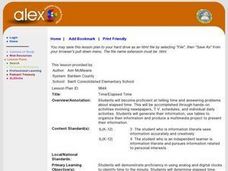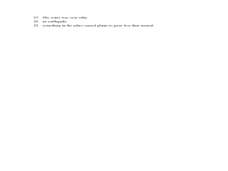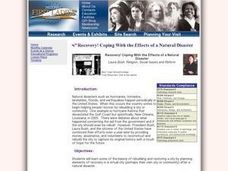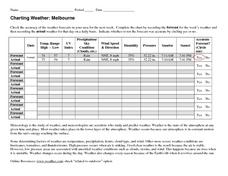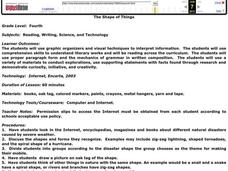American Museum of Natural History
Make Your Own Weather Station
Scholars build a weather station equipped with a wind vane, rain gauge, and barometer. Following an informative page about the weather, learners follow steps to build their pieces then turn into meteorologists to chart the weather they...
Curated OER
Wiki Comment: The News and You
Kids explore the world of news media by creating a wiki page. They will create a wiki page on the Internet in order to comment on and question the stories that take place in the world. They will practice creative writing by summarizing...
Curated OER
Multiplying With Nine As A Factor
Elementary math minds complete various activities to memorize the multiples of nine. They watch a PowerPoint presentation and demonstrate the finger trick. Unfortunately the link to the multiplication activities does not take you...
Curated OER
Time/Elapsed Time
Young mathematicians complete various activities to demonstrate proficiency in telling time and identifying elapsed time. They analyze and discuss television schedules, create a booklet about their daily activities, produce a TV. guide,...
Curated OER
Water Cycle - A SiteMaker Presentation
Have your young scientists explore a single element of the water cycle and write a report to explain findings. Your class can take their writing through all the steps of the writing process and publish it using a Web-based multimedia...
Curated OER
Volcanoes and People
Students discover that volcanic eruptions are geologic events that take place within the upper part and on the surface of the Earth's lithosphere. They explain how volcanoes are related to the Earth's lithosphere. They focus on the May...
Teach Engineering
Weather Forecasting
According to the Farmers' Almanac, the weather will be nice today. Class members examine how weather forecasting plays a part in their lives with a resource that provides information on the history of forecasting, from using cloud...
Curated OER
Fifth Grade Science
In this science worksheet, 5th graders answer multiple choice questions about the ocean, animals, rocks, and more. Students complete 25 questions.
Curated OER
Weather or Not
Hypothetical meteorologists' quotes help young earth scientists become acclimated to weather vocabulary. The terms are all related to air masses and forms of precipitation. This is a fun way to discover if your learners are truly...
Curated OER
Understanding Weather
A succinct set of slides covers the main points for your weather unit. From the factors that contribute to conditions, to fronts and extreme occurrences, to the different types of clouds, numerous facts are listed in bullets. The only...
Northwest Regional Educational Laboratory
Writing Prompts for Elementary, Middle and High Schools
Work on descriptive, narrative, persuasive, and expository writing with 110 prompts! The writing prompts are organized by type of writing. Several are separated into collections for younger students so you can find prompts for your...
Glynn County School System
The Earth as a Planet
What does our planet have in common with other planets? What makes it unique? Find out in a PowerPoint presentation highlighting many earthly facts! The lesson describes Earth's atmosphere in detail and adds many other important facts...
NASA
Write the Book on Weather Metrics
It's not easy to measure the weather. Pupils learn about what all weather has in common—the atmosphere. Scholars discover how a meteorologists must be able to measure aspects of the atmosphere and decipher the data. They then create a...
Curated OER
Natural Disasters
Learners work together in groups to travel throughout the room to different stations. They practice making different natural disasters at each station. They also examine fault lines and the supercontinent Pangaea.
Curated OER
Weather Journal
Fifth graders keep a weather journal. In this weather lesson, 5th graders define types of weather, summarize types of weather, and keep a weather journal.
Curated OER
Keeping Our Pets Safe In An Emergency
Students fill out worksheets that teach them how to prepare for emergency situations and how to enable animal safety in emergency situations. In this emergency lesson plan, students talk about different kinds of emergencies and how they...
National First Ladies' Library
Recovery! Coping with the Effects of a Natural Disaster
Students explore natural disasters and the devastation caused by them. Using specified websites, learners examine how people rebuild after a disaster. In groups, they design and rebuild a community and conclude by writing an essay...
Curated OER
Air and Water in the Environment
Second graders participate in a three part lesson in which they identify and describe forms of moisture in the environment. Part one of the lesson involves the three stages of the water cycle, part two focuses on creating humidity by...
Curated OER
Charting Weather: Melbourne
In this earth science worksheet, students check the accuracy of the weather forecasts in their area for a week. Then they complete the chart by recording the forecast for the week's weather and then recording the actual weather for that...
Curated OER
Weather Word Search
In this weather words worksheet, students analyze 10 words in a word box that pertain to the weather. Students find these words in a word search puzzle.
Curated OER
Weather Alphabet Activity
In this weather activity worksheet, learners examine 25 weather-related terms and then put those terms into alphabetical order.
Curated OER
The Shape of Things
Fourth graders develop their writing skills. In this paragraph structure lesson, 4th graders research natural disasters, compile their findings, create mobiles and write stories based on the mobiles.
Curated OER
Wild Weather Antonyms and Synonyms Worksheet
Have your language arts class expand their science-related vocabulary with this graphic organizer. They will take the 15 words listed and find an antonym and synonym for each.
Curated OER
Slave Culture during the Age of Jackson
Students consider slave culture during the time of Andrew Jackson. In this lesson on slavery, students watch a PowerPoint presentation, take notes, then analyze an extensive list of primary sources in order to understand what and how...





